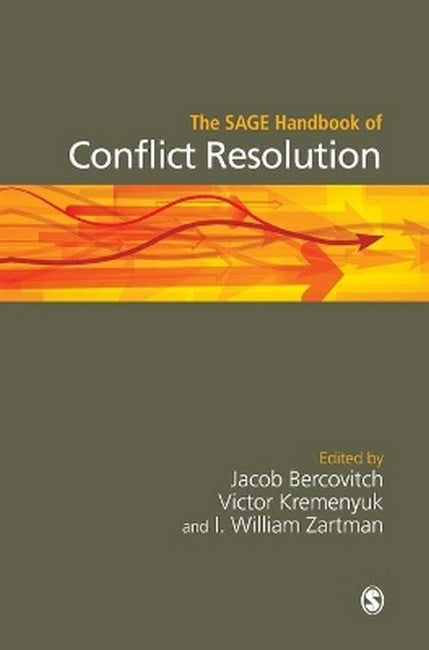Jacob Bercovitch is professor of international relations and Head of the School of Politics at the University of Canterbury in Christchurch, New Zealand. He was a senior fellow at the U.S. Institute of Peace in 2001-2002 and is widely regarded as one of the leading scholars in the field of international conflict management.
Request Academic Copy
Please copy the ISBN for submitting review copy form
Description
Introduction: The Nature of Conflict and Conflict Resolution - Jacob Bercovitch, Victor Kremenyuk and I William Zartman PART I: History and Methods of Study The Evolution of Conflict Resolution - Louis Kriesberg Diplomacy and Conflict Resolution - Christer Joensson and Karin Aggestam Conflict Resolution in the International System: A quantitative approach - J. David Singer and Shahryar Minhas Case Studies and Conflict Resolution - Jack S. Levy Game Theory as an Approach to Conflict Resolution - Rudolf Avenhaus Experimental Research on Social Conflict - Dean G. Pruitt Doing Conflict Research Through a Multi-Method Lens - Daniel Druckman Problem Solving Approaches - Tamra Pearson d'Estree Constructivism and Conflict Resolution - Richard Jackson PART II: Issues and Sources of Conflict Territory as a Source of Conflict and a Road to Peace - John A. Vasquez and Brandon Valeriano Economic and Resources Causes of Conflicts - Philippe Le Billon Resolving Ecological Conflicts: Typical and special circumstances - Gunnar Sjoested Ethnicity, Negotiation and Conflict Management - Donald Rothchild Ethno-Religious Conflicts: Exploring the role of religion in conflict resolution - S. Ayse Kadayifci-Orellana PART III: Methods of Managing Conflict Conflict Prevention: Theory in pursuit of policy and practice - Michael Lund Conflict Resolution and Negotiation - I. William Zartman Mediation and Conflict Resolution - Jacob Bercovitch The Settlement of International Disputes by Legal Means - Arbitration and Judicial Settlement - Franz Cede Dialogue as a Process for Transforming Relationships - Harold H. Saunders NGOs and Conflict Resolution - Andrea Bartoli United Nations Mediation Experience: Practical lessons for conflict resolution - Connie Peck PART IV: Current Features and Dilemmas in the Study of Conflict Resolution Terrorism and Conflict Resolution - William A. Donohue Media and Conflict Resolution - Eytan Gilboa Democracy and Conflict Resolution - David Kinsella and David L Rousseau Why Mediation Matters: Ending intractable conflicts - Chester A. Crocker, Fen Osler Hampson and Pamela Aall Culture and Conflict Resolution - Guy Olivier Faure Peacekeeping and Beyond - Paul F. Diehl Reconciliation as a Peace-Building Process: Scope and limits - Valerie Rosoux Assessing Outcomes: Conflict management and the durability of peace - Scott Sigmund Gartner and Molly M Melin Peace versus Justice - and Beyond - Cecilia Albin The Spread of Civil War - Kristian Skrede Gleditsch Conflict Resolution and Human Rights: The state of the art - Eileen F. Babbitt Resolution of Military Conflicts and Confrontations (Force and Arms Control) - Victor Kremenyuk Training and Education - Paul Meerts Conclusion: Emerging Problems in Theory and Practice - Jacob Bercovitch, Victor Kremenyuk and I. William Zartman
'The SAGE Handbook of Conflict Resolution demonstrates the range of themes that constitute modern conflict resolution. It brings out its key issues, methods and dilemmas through original contributions by leading scholars in a dynamic and expanding field of inquiry. This handbook is exactly what it sets out to be: an indispensable tool for teaching, research and practice in conflict resolution' - Peter Wallensteen, Professor of Peace and Conflict Research, Uppsala University and University of Notre Dame 'Bercovitch, Kremenyuk and Zartman are among the most important figures in the conflict resolution field. They have pieced together, with the help of more than 35 colleagues from numerous countries, a state-of-the-art review of the sources of international conflict, available methods of conflict management, and the most difficult challenges facing the individuals and organizations trying to guide us through these conflict-ridden times. The collection is brimming with penetrating insights, trenchant analyses, compelling cases, and disciplined speculation. They help us understand both the promise of as well as the obstacles to theory-building in the new field of conflict resolution' - Lawrence Susskind, Professor and Director of the MIT-Harvard Public Disputes Program 'The last three sentences of this persuasive book: "We conclude this volume more than ever convinced that conflict resolution is not just possible or desirable in the current international environment. It is absolutely necessary. Resolving conflicts and making peace is no longer an option; it is an intellectual and practical skill that we must all posses." If you are part of that "we," intellectually or professionally, you will find this book a superb companion' - Thomas C. Schelling, Professor Emeritus, Harvard University and University of Maryland

